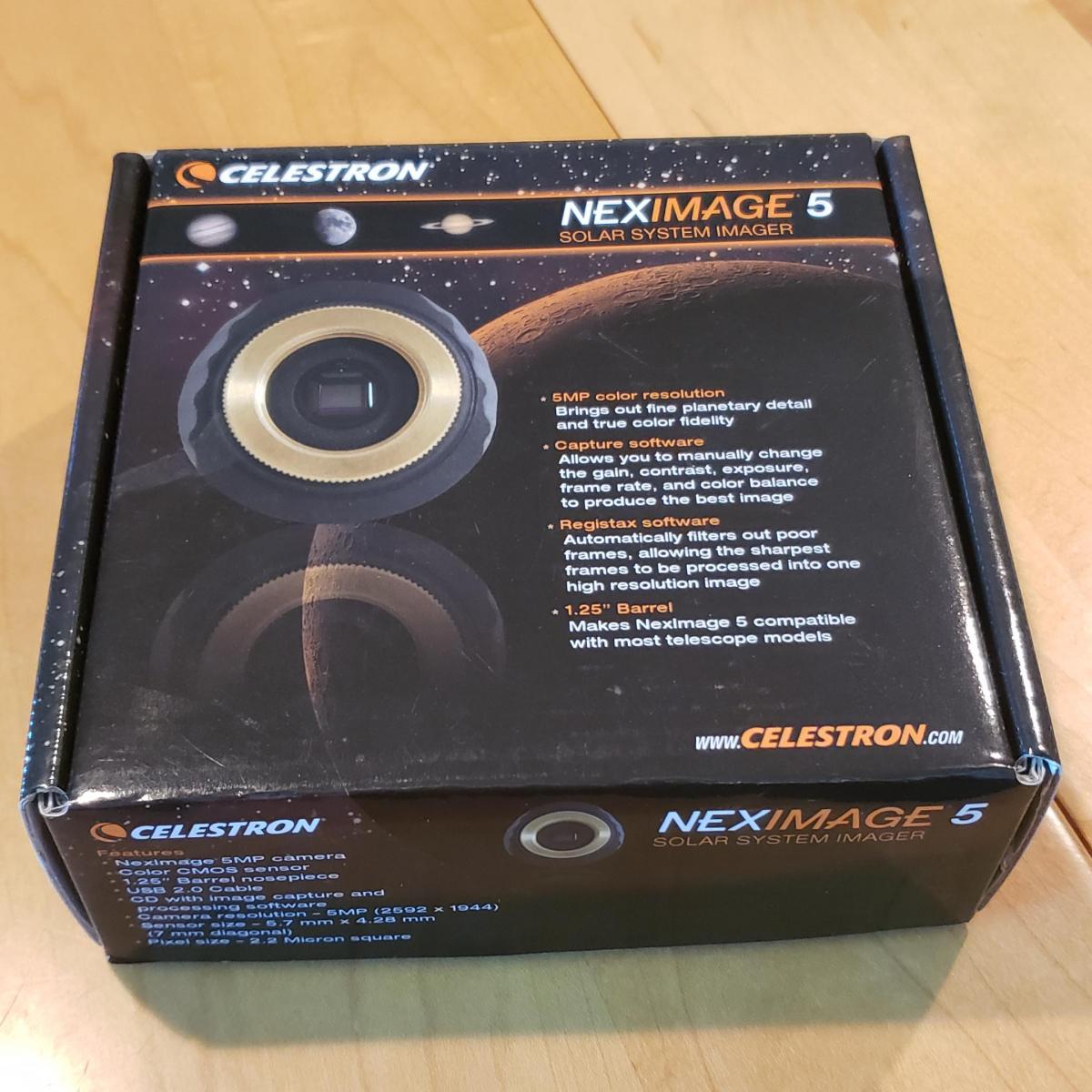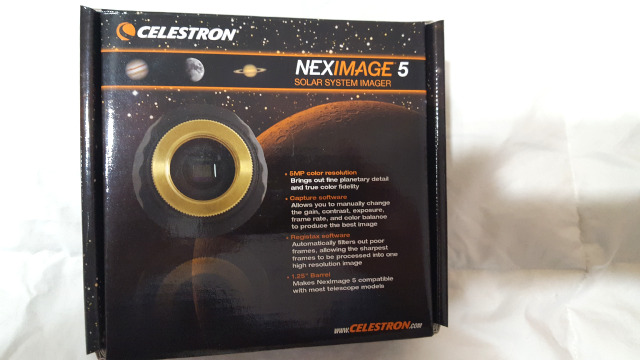This is a comparison video between the Celestron NexImage 5 and NexImage 10. These are both good cameras that I use often for microscopy, and they are also g. I wanted to show you how objects look when they're out of focus with a Celestron Neximage5 webcam connected to a telescope in this video I will show you how.
- February 10, 2021 2.5.1547.4007
Software application to capture and display single images, image sequences and image data streams from all WDM video sources (cameras, converters etc.) manufactured by The Imaging Source.
Version
2.5.1547.4007
Released
February 10, 2021
Type
EXE
Filesize
9.7MB
Requirements
- Intel Core i3 or similar, 2 GB RAM
- Windows 7 (32 & 64 bit), Windows 8 (32 & 64 bit), Windows 10 (32 & 64 bit)
Changelog
- Added MP4 container for video capture.
- Added WMV container for video capture.
- Added built in h264 and h265 codecs.
- May 11, 2020 2.5.1525.3931
Software application to capture and display single images, image sequences and image data streams from all WDM video sources (cameras, converters etc.) manufactured by The Imaging Source.
Version
2.5.1525.3931
Released
May 11, 2020
Type
EXE
Filesize
9.7MB
Requirements
- Intel Core i3 or similar, 2 GB RAM
- Windows 7 (32 & 64 bit), Windows 8 (32 & 64 bit), Windows 10 (32 & 64 bit)
Changelog
- IC Capture 2.5 is built as a 64-bit application.
- Display warning messages for common system misconfigurations, e.g. missing USB drivers.
- Reduced CPU load, especially when using multiple high-resolution cameras.
- Improved renderer performance.
- Display frame statistics in the status bar.
- Fixed corrupted toolbar icons in 125% UI scaling mode.
- February 9, 2017 2.4.642.2631
Software application to capture and display single images, image sequences and image data streams from all WDM video sources (cameras, converters etc.) manufactured by The Imaging Source.
Version
2.4.642.2631
Released
February 9, 2017
Type
EXE
Filesize
4.8MB
Requirements
- Intel Core i3 or similar, 2 GB RAM
- Graphics card with 24 or 32 bit
- Windows XP, Windows Vista, Windows 7 (32 & 64 bit), Windows 8 (32 & 64 bit), Windows 10 (32 & 64 bit)
- DirectX 9.0c or higher
Changelog
- RGB64 video format saving as TIFF resulted in a black image. This is fixed now.
- February 11, 2016 2.4.633.2555
Software application to capture and display single images, image sequences and image data streams from all WDM video sources (cameras, converters etc.) manufactured by The Imaging Source.
Version
2.4.633.2555
Released
February 11, 2016
Type
EXE
Filesize
4.8MB
Requirements
- Intel Core i3 or similar, 2 GB RAM
- Graphics card with 24 or 32 bit
- Windows XP, Windows Vista, Windows 7 (32 & 64 bit), Windows 8 (32 & 64 bit), Windows 10 (32 & 64 bit)
- DirectX 9.0c or higher
Changelog
- Minor changes.
- October 14, 2015 2.4.612.2455
Software application to capture and display single images, image sequences and image data streams from all WDM video sources (cameras, converters etc.) manufactured by The Imaging Source.
Version
2.4.612.2455
Released
October 14, 2015
Type
EXE
Filesize
4.3MB
Requirements
- Intel Core i3 or similar, 2 GB RAM
- Graphics card with 24 or 32 bit
- Windows XP, Windows Vista, Windows 7 (32 & 64 bit), Windows 8 (32 & 64 bit), Windows 10 (32 & 64 bit)
- DirectX 9.0c or higher
Changelog
- Bugfix: Fixed a crash when using vignetting effect on RGB24 video format.
- October 5, 2015 2.4.611.2455
Software application to capture and display single images, image sequences and image data streams from all WDM video sources (cameras, converters etc.) manufactured by The Imaging Source.
Version
2.4.611.2455
Released
October 5, 2015
Type
EXE
Filesize
4.3MB
Requirements
- Intel Core i3 or similar, 2 GB RAM
- Graphics card with 24 or 32 bit
- Windows XP, Windows Vista, Windows 7 (32 & 64 bit), Windows 8 (32 & 64 bit), Windows 10 (32 & 64 bit)
- DirectX 9.0c or higher
Changelog
- Added 'WDR' button to the toolbar. This button simultaneously enables 16-bit image capture, tone mapping and highlight reduction.
- Ctrl+Mousewheel zooms the view, focusing on the cursor position.
- Holding down the middle mouse button allows scrolling in the live view.
- Improved handling of DFG/HDSDI by auto-selecting video format and frame rate depending on the video source's format.
- Use DirectX 11 for video rendering, if available.
- March 10, 2015 2.4.577.2337
Software application to capture and display single images, image sequences and image data streams from all WDM video sources (cameras, converters etc.) manufactured by The Imaging Source.
Version
2.4.577.2337
Released
March 10, 2015
Type
EXE
Filesize
4.3MB
Requirements
- Intel Core i3 or similar, 2 GB RAM
- Graphics card with 24 or 32 bit
- Windows XP, Windows Vista, Windows 7 (32 & 64 bit), Windows 8 (32 & 64 bit), Windows 10 (32 & 64 bit)
- DirectX 9.0c or higher
Changelog
- New device selection dialog, that shows firmware and driver version.
- New False Colors effect. Known problem in Windows XP: The buttons in the property dialog do not show the selected colors.
- New Perspective Distortion effect.
- New Vignetting effect.
- May 8, 2014 2.3.394.1917
Software application to capture and display single images, image sequences and image data streams from all WDM video sources (cameras, converters etc.) manufactured by The Imaging Source.
Version
2.3.394.1917
Released
May 8, 2014
Type
EXE
Filesize
2.3MB
Requirements
- Intel Core i3 or similar, 2 GB RAM
- Graphics card with 24 or 32 bit
- Windows XP, Windows Vista, Windows 7 (32 & 64 bit), Windows 8 (32 & 64 bit), Windows 10 (32 & 64 bit)
- DirectX 9.0c or higher
Changelog
- Added handling of new properties of GigE and USB cameras.
The first step in planetary imaging is making a video file of the planet. The goal is to collect as many frames as possible in a limited amount of time. The time is limited because the planet rotates. Christophe Pellier did some experiments that he published here:
Celestron's NexImage 5 Solar System Imager (5MP) (C-Thread). 1.25 Inch Barrel Nosepiece Adapter (to C-Thread). Link to the: NexImage 5 Instruction Manual. Link to a: Driver Update for Imaging Software and USB. 2 Year Warranty. Find Neximage software downloads at CNET Download.com, the most comprehensive source for safe, trusted, and spyware-free downloads on the Web.
He has lots of other good material for us so I recommend spending some time checking out his site.

Neximage Icap
The most critical step in planetary imaging is capture. You can screw up everything else and then later be able to get a good picture from your video file when you learn what you did wrong. Happiness is getting a good video file.
Using iCap
iCap is the capture software that comes with the NexImage 5 webcam. This camera takes excellent pictures and is priced under $200 so it is very popular. iCap is filled with landmines that I warn you about in this video. I will mention a few here but you really need to watch the whole video before you go out in the dark with it.
iCap requires you to select a frames per second (FPS) setting. This can only cause problems as I explain in the video. Also, the FPS setting will change to something you don’t want when you’re not looking. Always check the FPS setting just before hitting record.
iCap is capable of creating a worthless .avi file due to allowing you to mix codecs between two drop-down menus.
Once you get used to iCap it is actually pretty good. This is like fire. It is wonderful but if you’re not careful it will burn you.


Using FireCapture
FireCapture is the most popular capture software and it supports many cameras. You can see which cameras it supports and also download the software here. Note that to use FireCapture with the NexImage 5 you want to select The Imaging Source camera.
This video shows how to use FireCapture version 2.3 which is no longer the latest version. The latest version has changed in appearance, a lot. Still, the video should at least tell you what capabilities to look for when you use the latest version.
Neximage 5 Manual
Histogram
Histograms are powerful tools for planetary imaging. Without using histograms you’re flying blind. This video tells you what histograms are and how they’re used for planetary imaging.
Neximage Solar System Imager Driver


Exposure, Gain, etc.
Neximage 5 Driver Free
Getting the right capture settings can be tricky. In this video I start with not knowing how to set brightness, contrast, exposure time (length of video), exposure time (shutter speed), gain, gamma, focal ratio, frames per second (frame rate), histogram, saturation, and total number of frames to collect. There are too many combinations to experiment with. In the video I get it down to just exposure (shutter speed), gain, and histogram.
The histogram is not something we set but is a function of gain and exposure time. If we decide we want to attempt to get a 40% histogram then the gain becomes a function of the exposure time and we only have one variable to experiment with. We want to use an exposure time that will allow the maximum frame rate. For a bright planet the camera’s max frame rate may be the limiting factor. For a dim planet we end up setting the gain to 100% and then adjust the exposure time to get 40%.